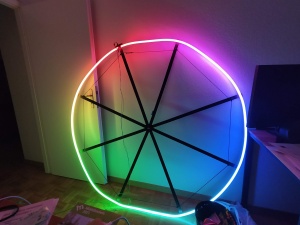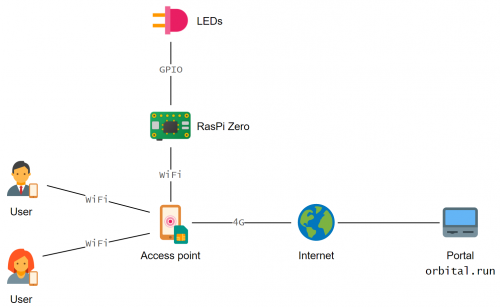Difference between revisions of "Orbital"
Protectator (Talk | contribs) (→Chronology) |
Protectator (Talk | contribs) (→Orbital-Portable) |
||
| Line 112: | Line 112: | ||
* 07.05.2022 : An other friend's birthday party (~30 people) | * 07.05.2022 : An other friend's birthday party (~30 people) | ||
* 27.08.2022 : Weekend in a Swiss chalet (battery-powered) (~5 people) | * 27.08.2022 : Weekend in a Swiss chalet (battery-powered) (~5 people) | ||
| − | * 27 + 28.10.2022 : VIFFF's evening parties (2* | + | * 27 + 28.10.2022 : [[https://vifff.ch VIFFF]]'s evening parties (2* 100 people) |
= External links = | = External links = | ||
Revision as of 16:06, 26 February 2023
Orbital is a game designed to be played on addressable LED strips, on any one dimensional array of lights.
Contents
Goal
Control a pixel and try to shoot down others while staying alive ! The last one standing wins.
Structure
The term "Orbital" may refer to either just the software that controls the game and the lights, or the whole construction that is comprised of, minimally :
- A strip of addressable LEDs
- A computer that is connected to the LEDs, running both the Orbital game server, and the LEDs controller server.
The "game server" is now also able to play atmospheric animations.
The code for the game server is hosted on GitHub : https://github.com/Pecamo/orbital
Gameplay
Game mode
You play Orbital against other players, each using their smartphone. To start a game, at least two players are needed. Once the game starts, each player is assigned a color, a LED lights up to that color. A player controls their LED using three buttons on their phone :
- Left : Moves the player's LED to the left
- Right : Moves the player's LED to the right
- Shoot : Fires a projectile in the last moved direction. The distance it travels is proportional to the time elapsed since the last shot.
The goal is then to "kill" other players by firing a projectile at them all while staying alive. Two projectiles that meet cancel each other.
There's not real maximum amount of players, however in practice having 8 players at the same time already starts to be confusing.
Strategy
With the default settings, players usually evade a projectile by staying at a long enough range or by firing at the incoming one. The battle royale mode forces the remaining players to get close to each other rapidly. Once only two players remain and are at close range, the strategy game that emerges is similar to a basic version of footsies in classic fighting games.
Settings
Some mechanics elements can be altered to diversify gameplay between games. For example :
- Activate "Battle Royale" mode to make a growing part of the field become deadly, forcing the remaining players to get closer to each other.
- "Missile collision" controls whether two projectiles cancel each other, or even if only the weakest one gets destroyed.
- "Shot cooldown" controls the minimum amount of time a player must wait to shoot again.
Lamp mode
There's also a "Lamp mode", which is not a game : it uses the LED strip to play atmospheric animations. The animations are pre-programmed patterns that have varying customizable parts (such as speed, color, brightness, etc.).
Instances
There is currently two slightly different variants of what we call "Orbital" that are running.
Orbital FIXME
Orbital FIXME is the name of the Orbital instance that runs in the local. You can play it on orbital.fixme.ch
This is the original version and first running instance of the game.
This instance is composed of a RaspBerry Pi running the software, connected to an strip of 300 LEDs. The whole strip of LEDs is attached to a circular construction made of flat bendable metal rods bolted together. The result looks like a circle of LEDs, pointing inwards so that someone "inside" the circle can see all of the by turning around.
This circle that has a diameter of approximately 2m hangs on the ceiling, over the sofas.
Orbital Portable
Orbital Portable is a variant whose purpose is to be portable so that we can deploy it wherever we want. The goal is to bring it to events and parties, and bring people together by making they play a simple using their phone.
For the game to work and be easily accessible to any player, the construction had to be more complicated than the FIXME variant.
This version is composed of :
- A strip of addressable LEDs.
- A foldable wooden construction that the strip can latch on to.
- A Raspberry Pi Zero connected to the LEDs, running both the Orbital game server and the LEDs controller server.
- A power source for the RasPi. We can either connect it to a standard electric Swiss socket, or to an external battery system.
- A phone that runs a WiFi access point. (We usually just use our personal phone)
- A "portal", which is a public web page that will redirect connecting players to the RasPi's local IP address. In this case, it is accessible at https://orbital.run
Visualization
Here's a diagram showing how all of the required collaborating components are connected.
Chronology
- 21.08.2019 - 25.08.2019 : Ideation and start of development during CCCamp2019.
- 09.2019 : First working version of Orbital FIXME finished
- 09.2020 : Ideation of Orbital-Portable
- 05.2021 - 07.2021 : Building hardware of Orbital-Portable
- 08.2021 : First release of Lamp mode
- 05.2022 : Lamp Animations "framework"
- 08.2022 : Frontend entirely re-writter in Vue 3
Orbital-Portable
Here are the different events during which Orbital-Portable has been used :
- 16.07.2021 : At a friend's house (~10 people)
- 13.11.2021 : Party in a cave (battery-powered) (~30 people)
- 24.04.2022 : A friend's birthday party (~30 people)
- 07.05.2022 : An other friend's birthday party (~30 people)
- 27.08.2022 : Weekend in a Swiss chalet (battery-powered) (~5 people)
- 27 + 28.10.2022 : [VIFFF]'s evening parties (2* 100 people)




